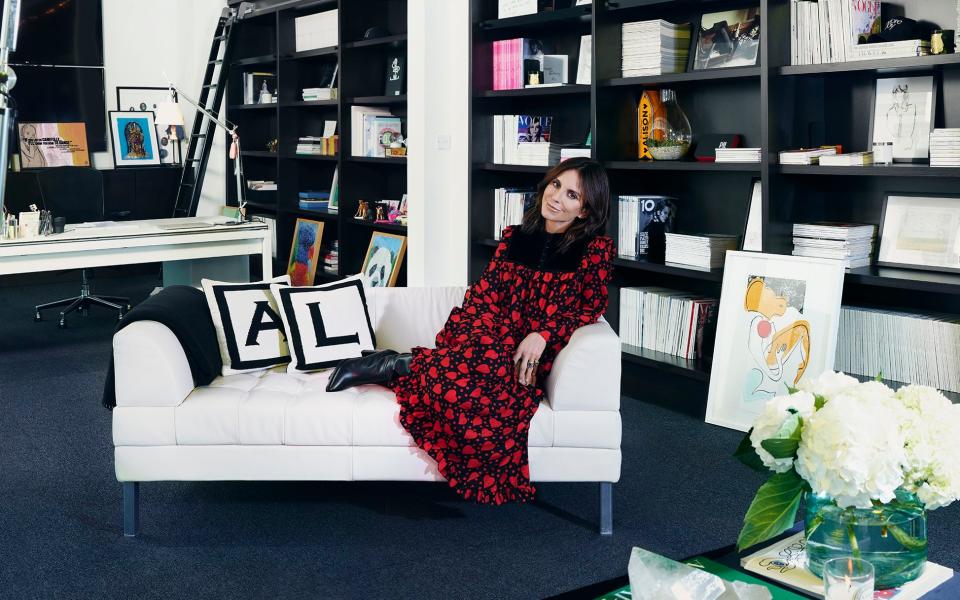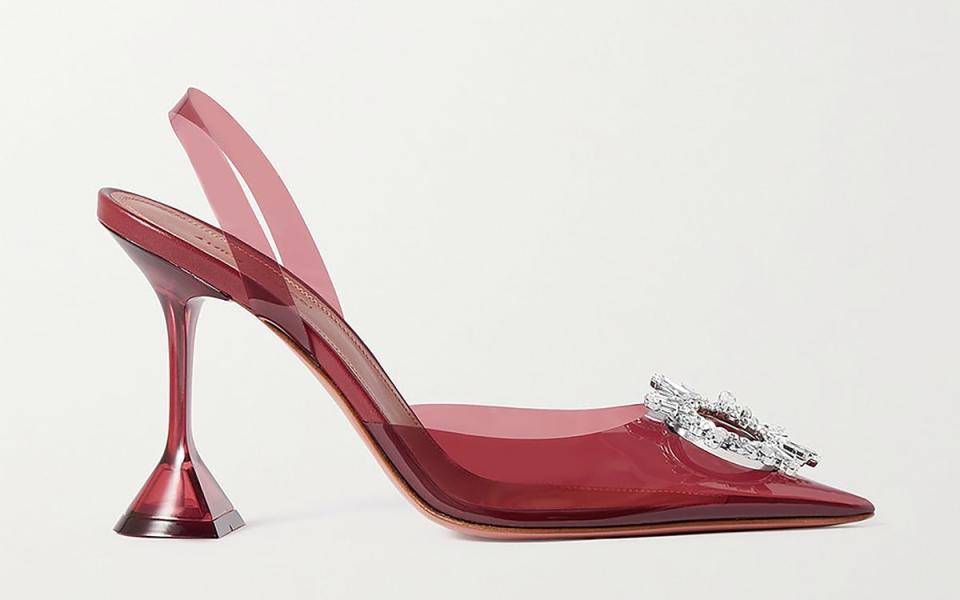Meet Alison Loehnis, the woman steering Net-a-Porter through Covid and Brexit

How perfect that Alison Loehnis’s office is shaped like a long, curved catwalk. And entirely in character that she meets you two thirds of the way down it. The American president of Net-a-Porter, the British company that’s still, 21 years after its launch, one of fashion’s most forward-thinking, sexiest businesses, is not a sadist. There’s no having to mince down to the other end where her desk is while she marks your outfit out of 10. When you sit on the custom-designed white leather sofa with initialled cushions from Jonathan Adler, she regularly checks to see whether you’re comfortable (it’s a bit slidey-offy, but you’ll survive). She has the posture of a ballerina. That’s Pilates for you.
She has noticed your outfit, of course, because she will later use it to illustrate points in her argument. For the record, she’s wearing black skinny jeans from Mother, cropped at the (bare) ankle, a white fitted Charvet shirt and flat Gabriela Hearst jazz-style shoes. Her husband, Al Loehnis (they are virtually homonymous), says she always wears the same clothes. But anyone whose fashion antennae are on the alert could tell you she hardly ever wears the same things. There are the Saint Laurent bouclé jackets; the La DoubleJ flower-power flared trousers; the Lisa Marie Fernandez floaty evening dresses... It’s fair to say she’s what Net-a-Porter’s buying team would probably term A Global Citizen.
You’d expect such fashion experimentation from someone at this altitude, but she also has a brain formatted like a data-analysis program. She loves selling. Her first ever job was working for Ralph Lauren during her holidays in East Hampton. Later jobs included stints at Thomas Pink and Saatchi & Saatchi. The daughter of an advertising executive (her mother) and fragrance-industry big cheese (her father), and an alumna of (Ivy League) Brown University, Loehnis was raised in upper-middle-class comfort in Manhattan. One of her best friends from school is Aerin Lauder. She’s thin, toned, speaks staccato and – this, you do not necessarily expect from a data-analysis brain – funny. But then you needed a sense of humour to survive in fashion retail for the past 22 months.

The hardest decision, maybe of her career, she says, ‘was closing the warehouses at the start of the first lock-down, but it was also a straightforward one because it had to be done to keep staff there safe’.
It meant effectively that if people were still shopping during those early, frightening days (and confoundingly, demand soared for Amina Muaddi’s distinctive splayed-base 95mm heels, £850 for the diamanté-buckled ones; pictured below), the orders were, for six long weeks, fulfilled from Net-a-Porter’s Hong Kong warehouse, which remained open throughout. Not ideal for a company that’s always led on service as well as promising 90-minute deliveries in London and New York. ‘But the other thing was that we raised our EQ [emotional intelligence] in order to talk to the customers in a completely different way.’ Some really weren’t in the mood to shop, and others couldn’t get enough content – everything from how to perform an at-home facial to how to clear your wardrobes. ‘It wasn’t just about keeping them in the loop, but doing away with all that buy, buy, buy mentality. Now it’s all about how versatile is this? How many seasons can you wear it? Trends aren’t prescriptive any more. The miniskirt is back, but we’re still selling way more midis and maxis. TikTok said skinnies were dead, but you’re not going to get slaughtered for wearing a pair.’
The pandemic meant a lot more video content. That included contributions from Loehnis, who found herself regularly broadcasting to Net’s staff across the globe. She addressed the troops from the cottage in the Cotswolds where the other Al was also working (as a business consultant) and their children, Milo, 15, and Tilly, 13, were homeschooling. And yes, her style changed during lock-down. There were a lot more flats, denim and Prada outerwear. By May the Loehnises were back in their London home, in Hammersmith’s grandest square. ‘I really like being in the office. I’m a sociable person’. Currently most staff are still doing three days at home, but when the time is right, they’ll all be back. ‘It’s not that difficult,’ she says, when I ask why she thinks some bosses report that they can’t get staff to return full time. ‘You listen to your staff, you follow the government guidelines, and you do what’s best for the business’.

Speaking of which, just as the pandemic – maybe – recedes, ta-da, there are worldwide shortages, and Brexit. What the hell are they doing about those, one friend, a keen but disgruntled Net customer wants me to ask. ‘The complexity of doing business has undoubtedly increased,’ responds Loehnis with presidential diplomacy. ‘But as a global business shipping to 180 countries around the world, we’re well experienced in managing challenges.’
Privately, I think this issue must drive her crazy – no, not that exactly, she doesn’t do crazy, but it must vex her. Upping Net’s service game is what makes her tick. That’s why Net recently embarked on a joint venture with Reflaunt, a resale site. The e-tailer that made it ever easier to buy new clothes is making the business of buying and selling second-hand ones a cinch. ‘We’ve been looking at resale for a long time,’ she says. She tried a bunch of secondary retail sites to see how they worked. ‘The question for me was: how painless can you make it?’
The Net/Reflaunt venture certainly makes getting rid of old designer clothes simpler – it takes care of the photography, the collection, the shipping, and ensures your products get in front of the maximum amount of eyeballs. Customers who access the service via Net- a-Porter’s site can choose to have their takings paid directly into their accounts, or receive them in the form of Net-a-Porter vouchers, with an additional 10 per cent added. So if your old Gucci horsebit bag sold for £600, you’ll bank £660 worth of vouchers.
This is Net’s second big step into more conscious retail. Two years ago it launched Net Sustain, an edit of exclusive eco-friendly designs from around 40 designers, including Stella McCartney, Ninety Percent and Mother of Pearl. Now it’s at 150.
But the bottom line is that Net-a-Porter is a business predicated on selling more. And that’s a conflict, surely? Loehnis, who could be described as a one- woman circularity loop, giving her love of selling and shopping (she bought one Alessandra Rich dress during lockdown ‘with absolutely no idea where I’d ever wear it, but I knew I’d wear it one day, and for me that was an optimistic gesture’), believes it’s possible to run a profitable fashion empire that doesn’t trash the planet, though ‘I’m not suggesting we’re there yet.’
ThredUp, an online ‘consignment store’ (ie, selling second-hand items on behalf of the owner) listed on the Nasdaq stock exchange, predicts that the global resale market will be worth $64 billion by 2025. But Loehnis doesn’t do things cynically. ‘On a personal level the whole notion of circularity really resonates with me. And demand is also coming from customers. Maybe it’s low double digits at the moment, but it’s growing. We started Net Sustain because customers wanted a sustainability filter. Now we’re at the stage where if you have two identical navy cardigans like the one you’re wearing [pointing to mine, which as it happens is sustainably made by &Daughter] at a similar price, customers increasingly opt for the sustainable one.’

It’s all so much more complicated than it was when Natalie Massenet, Loehnis’s former boss, launched the site from her home in 2000, and nine years later followed it with The Outnet, selling discounted clothes from past seasons. Massenet created a role for Loehnis as vice president, and Loehnis was heavily involved in setting up The Outnet, which she still oversees, along with the menswear site Mr Porter. Not bad for someone who never went to business school and at one time thought she’d work in film.
The Outnet was a game changer, both for Net-a-Porter’s fortunes, since it solved the problem of what to do with old stock, and the industry in general, because it gave a new lease of life to items that might have languished for ever in warehouses or ended up as landfill. Massenet sold the business to Richemont in 2010, bagging an estimated £50 million, and another £50 million or so when it merged with the Yoox Group. She left in 2015 amid rumours of disagreements with the new management style.
For one thing, there’s more competition. Farfetch, which launched in 2007, is snapping at Net-a-Porter’s heels. Its business model – providing a platform and back-end logistics for more than 700 labels and boutiques around the world, while holding no stock of its own – has been hailed as a better long-term bet than Net’s by some industry analysts. Did the latest figures jolt her? ‘Listen, when you look at anyone’s numbers...’ (The date of our interview is just before a set of financial results published by Richemont that show the ‘online distribution’ segment of its business, which includes Net-a-Porter, continues to make a sizeable loss.) She pauses. ‘You should constantly be looking at your own model. The bulk of our strategy is still about buying stock.’ There are a few brands it works with on a concession basis, which means Net gets a percentage of sales and can return unsold stock. ‘We’re definitely not a marketplace business,’ she stresses. ‘We’re all about the curation.’
Technology is ever more complex. She thinks a form of AI that will genuinely help customers understand how items will look on them before they buy is not that far off – maybe a year or two. Loehnis loves techie stuff when it delivers what she needs to keep Net-a-Porter ‘not just relevant, but at the forefront’. She’s all over that site (‘I think that’s probably my most irritating trait as a boss: I always find the glitches’). But she’s not just peeking into every nook and corner as president, looking for potential problems, she’s there as a customer searching for fashion thrills and, usually, finding them. Long may the thrill be contagious.

 Yahoo Finance
Yahoo Finance 